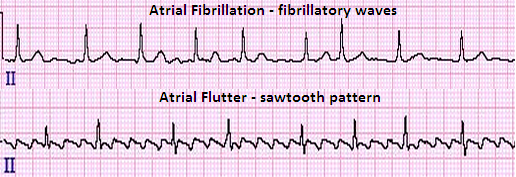Atrial Fibrillation and Anticoagulation
/What is Atrial Fibrillation?
Risk factors for AF include:
- Age
- Hypertension
- Diabetes mellitus
- MI
- VHD
- HF
- Obesity
- Sleep apnea
- Cardiothoracic surgery
- Smoking
- Exercise
- Alcohol
- Hyperthyroidism
- Increased pulse pressure
- European ancestry
- Family history
The issue with atrial fibrillation is that blood pools in the heart due to inefficient pumping and can cause a clot to form which can lead to a stroke.
Antithrombotic therapy should be individualized. Selection of therapy is based on the risk of clot regardless of AF pattern. In patients with nonvalvular AF, the CHA2DS2-VASc score is recommended for assessment of stroke risk.
Mechanical heart valvles: warfarin is recommended and the INR goal of 2.0-3.0 or 2.5-3.5 depends up on the type/location of prosthesis.
If patient has had a stroke with nonvalvular AF, TIAs, or a CHA2DS2-VASc score of 2 or greater, oral anticoagulants are recommended in this order: warfarin (INR 2-3), dabigatran/rivaroxaban/apixaban.
Warfarin measure INR at least weekly during start of treatment and monthly when stable.
Bridging therapy: bridge with UFH or LMWH recommended for patients with AF and a mechanical heart valve undergoing procedures that require interruption of warfarin.
If patient doesn't have a mechanical valve, balance the risk of stroke vs. bleeding.
In the new anticoagulants, renal function should be re-evaluated when indicated and at least annually. For example, if you have a patient with end-stage CKD needing AF anticoagulation, warfarin would be the optimal choice since the newer agents are dependent upon renal clearance.
If CHA2DS2-VASc score is 0, you can omit antithrombotic therapy.
If CHA2DS2-VASc score is 1, no antithrombotic therapy or treatment with an oral anticoagulant or Aspirin may be considered.
Do not use dabigatran in patients with AF and a mechanical heart valve.
CHADS2 Acronym - maximum points = 6
- Congestive HF: Score 1
- Hypertension: Score 1
- Age >/= 75 y: Score 1
- Diabetes mellitus: Score 1
- Stroke/TIA/TE: Score 2
CHA2DS2-VASc Acronym - maximum points = 9
- Congestive HF: Score 1
- Hypertension: Score 1
- Age >/= 75 y: Score 2
- DM: Score 1
- Stroke/TIA/TE: Score 2
- Vascular disease (prior MI, PAD, or aortic plaque): Score 1
- Age 65-74: Score 1
- Sex category (i.e., female sex): Score 1
Warfarin or one of the newer anticoagulants (in non-valvular AF)? It seems now that the newer agents are preferred unless the patient is comfortable with INR measurements, wants the lower drug cost of warfarin, or patients with chronic kidney disease. If patient has valvular AF, use warfarin.
The question is how do you define non-valvular AF vs valvular AF? For some valvular means mechanical prosthetic and rheumatic mitral disease.
Trials on the subject:
RE-LY Trial
Rocket AF Trial
Aristotle Trial



